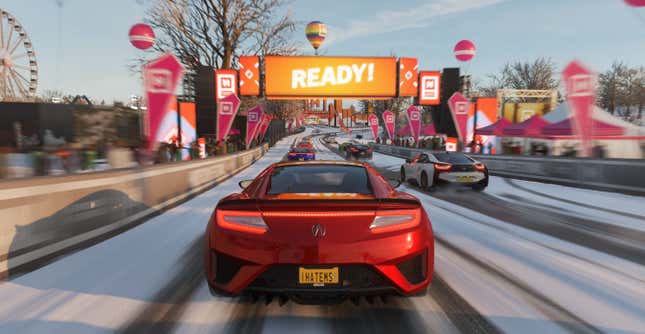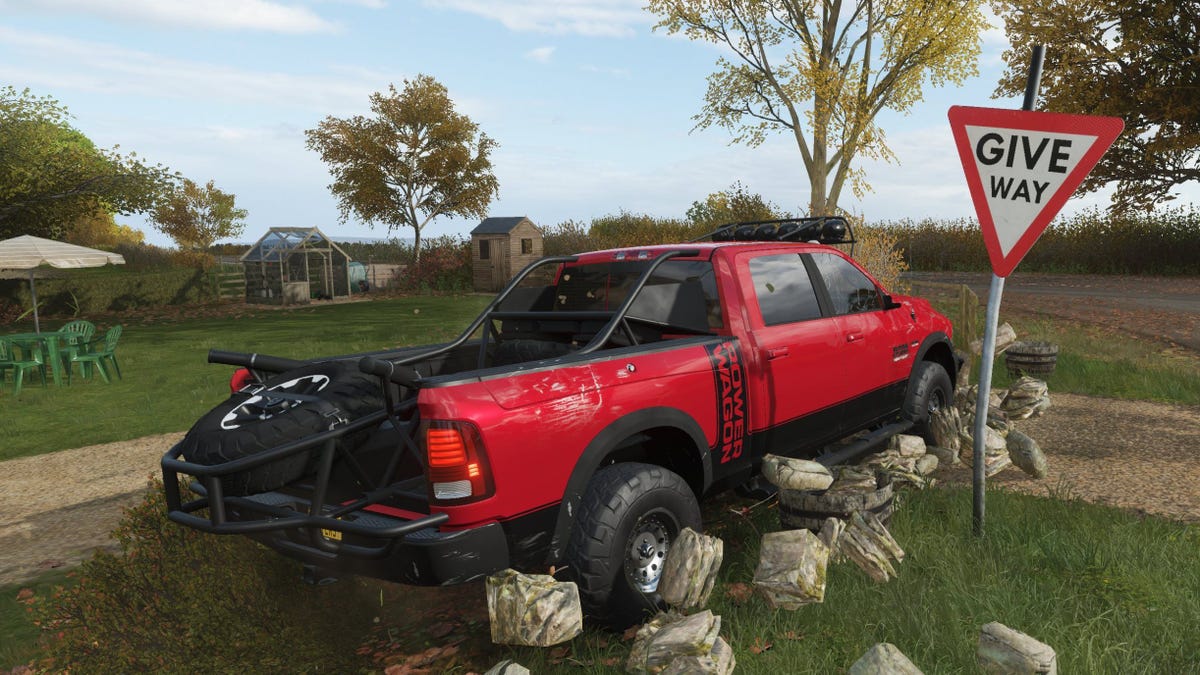News has arrived that Forza Horizon 4‘s DLC is getting unlisted from all gaming stores, with the entire game getting entirely pulled from sale this December 15. This is one of the most beloved racing games—hell, most beloved games—of the last decade. And in a few months, it’ll just be gone. Why? Because of licensing.
Originally released in 2018, Forza Horizon 4 brought the popular series to the bucolic setting of England’s Cotswolds, and won over everyone with its drystone walls and incongruent movie stunts. It was a work of art, and a brilliant racing sim. And while there’s since been Forza Horizon 5, this time in Mexico and equally great, FH4 still has an active community served by ongoing in-game “Festival Playlist” events (incredibly about to start series 77, which will be the last).
But, as developers Playground Games say in a statement issued June 25, they will soon not be able to sell the game. As in, it’s getting pulled from every online store before Christmas, with elements already gone today. The reason given is “licensing and agreements with our partners.”
Due to licensing and agreements with our partners, Forza Horizon 4 will be delisted from digital platforms (Microsoft Store and Steam) on December 15, 2024. This means the game and its additional content will no longer be available for purchase through online stores.
Honestly, this feels tragic. We are in a disastrous time for game preservation, accelerated by the move toward all-digital consoles, and enhanced by a publishing industry that’s morbidly hostile toward external attempts to preserve what they will not. But that it can happen to a game as recent, as loved, and as good as FH4, really brings home what an ephemeral, transitory gaming industry we’ve come to endure.
Playground’s statement doesn’t explain in any detail what licensing issues the game is facing (we have, of course, reached out to ask), so we don’t know if it’s to do with something as simple as the music used, or as complex as the litany of real-world car models in the game. There are over 750 accurately modeled cars from dozens of real-world car manufacturers, each of which will have had to be individually licensed to appear in the game, and during development the end of the contracts they had in place likely seemed impossibly far away to worry about. FH3 had only come out two years earlier in 2016, and it’s fair to say the Australian edition of the open-world series—despite being fantastic—didn’t have quite the same impact and longevity. So seven years likely felt more than enough.
Of course, these new events demonstrate that nothing but in-perpetuity can ever be enough.

Playground and Microsoft are doing everything right, right now, when it comes to Forza Horizon 4. The game is currently 80 percent off on Steam, with similar discounts planned for the Xbox store come mid-July. The companies are encouraging people to ensure they own full copies (rather than accessing it via Game Pass), and have promised that it will remain available to download, and indeed still be playable both offline and online, with multiplayer features maintained. Well, for the short-term, at least.
Playground has also said that those who bought DLC for FH4 while playing the Game Pass version will soon—if they have an active, full-price (as in, not discounted) Game Pass subscription right now—receive a “game token,” good through July 2026, to ensure you don’t need to buy it again. It’ll be gone from Game Pass come December 15.
But of course this leaves the enormous question: what about Forza Horizon 5? What about last year’s extraordinary Forza Motorsport? Will we be saying goodbye forever to these in 2028, 2030? (Again, we’ve asked.)
It’s worth noting that the release schedules for the Forza games has changed, as the games haven gotten bigger and more involved. For the 2010s, there was an alternating new Horizon or Motorsport every year. They were, in some sense, more “disposable.” But since 2018, we’ve only had two more games. It’s now been three years since there was a new Horizon—the longest gap since the series began in 2012—and there’s not been a mention of FH6 during all of the summer reveals. Losing Forza Horizon 4 this year is far more impactful as a result.

The answer surely has to be to make contingencies around licensing? Yes, I presume it’s actually far easier (while still enormously difficult) to accurately model 750 real cars, than to imagine up 750 entirely original models that don’t conflict with anything that already exists. But also, you know, we don’t actually need 750 cars. 100 would be lots! But at the very least, a suite of cars in the game that are entirely original, store-brand models that represent each of the most enjoyable archetypes, that can be left in the game until the heat-death of the universe. Warn players that everything else has a seven-year (or whatever) shelf-life, and then still have a playable—and more importantly—sellable game at the end of those contracts.
This would absolutely affect those who play these games for the realism, the precise portrayal of cars that offers the all-important simulation aspect. However, it would still allow the gearheads the same length of time with the game as before, but also provide a means to keep selling the product later. Sure, it would lose a lot of its identity, and it’s not a perfect solution. In-perpetuity contracts are the perfect solution. But maybe it’s better than the game never being sold again?
And this, of course, isn’t aimed exclusively at Forza. This is a common sense approach we desperately need every studio to be implementing when it builds games around licensed properties. It’s miserable that we’re losing so much art down this corporate well, and it’s now, today, impossibly short-sighted to walk into such a situation. (Let alone that these studios are being absolutely screwed over by the licensors, given a game like Forza is the most extraordinary advertising for car manufacturers.)
Licensing makes all sorts of sense for having a game look or sound flashy, absolutely. But unless in-perpetuity contracts can become the norm, contingencies must be built in from the ground up.
And hell, there’s no movie you now can’t watch because the lead character drove an Audi. (Indeed, Audi likely paid an enormous wad of cash to have their car appear in the film.) There’s no book that’s unpublishable because the protagonist drank a Coke. We can’t let games keep vanishing from existence for the sake of these short-term deals.
.

